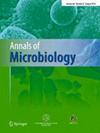与南非阿古哈斯海洋沉积物和湿地系统有关的放线菌多样性
IF 3.4
4区 生物学
Q2 BIOTECHNOLOGY & APPLIED MICROBIOLOGY
引用次数: 0
摘要
南非以其丰富的生物多样性而闻名。阿古哈斯平原就是这样一个独特的环境,低梯度地形造就了大面积的湿地。两大河系为其提供水源,带来咸水和碱性水。这里曾经历过重大的海侵和回归事件,拥有丰富的芬博斯多样性和地中海式气候,从而形成了独特的生态系统。因此,人们对与阿古哈斯平原及相关海洋生态系统有关的细菌多样性知之甚少,这一点令人惊讶。在这项研究中,我们重点研究了与阿古哈斯平原(SF;1-3 区)新兴泥炭地和距离 SF 10 公里的海洋遗址(ANP;海洋、岩石、干燥)相关的放线菌多样性(放线菌门)。研究人员采用元胞组学和分离相结合的方法来评估采样点的放线菌多样性,并确定环境理化参数对这些种群的影响。对 Sva0096 海洋仓进行了各种基因组分析,以深入了解其生态作用。Metataxanomics 显示,两个地点共享确定的主要类群,包括 Blastococcus、Geodermatophilus、Microbacterium、Mycobacterium、Nocardioides、Streptomyces 和 Sva0996 海洋类群。通过分析 Sva0996 海洋细菌群 bin134 的生物合成潜力(从 GenBank 获取),可以深入了解该细菌群在海洋和陆地环境中的潜在生态作用。在 2 号区和 3 号区(SF)以及 ANP 旱地样本中观察到了较高的放线菌多样性(香农指数 > 5)。研究发现,放线菌种群的组成受盐度、pH 值、锰和钙的影响,盐度(SF:70-100 Ω vs. ANP:100-160 Ω)和 pH 值(SF:6.3-8.0 vs. ANP:8.6-8.9)与海洋环境相似(甚至更高),pH 值也更低(SF:6.3-8.0 vs. ANP:8.6-8.9)。这项快照研究对所研究的两个地点的放线菌多样性提供了一些见解。对一个 Sva0096 海洋 bin134 的分析进一步揭示了 Sva0096 海洋类群在独特的陆地环境中生存的潜在能力,这种环境周期性地暴露在模拟海洋环境的环境压力下。本文章由计算机程序翻译,如有差异,请以英文原文为准。
Actinobacteria diversity associated with marine sediments and a wetland system, Agulhas-South Africa
South Africa is known for its great biodiversity. The Agulhas Plain represents one such unique environment where low-gradient topography has resulted in extensive wetland formation. It is fed by two major river systems, bringing in brackish, alkaline water. It has been exposed to major marine transgression and regression events, and harbours great Fynbos diversity as well as a Mediterranean-type climate, thereby creating unique ecosystems. It is therefore surprising that little is known about the bacterial diversity associated with the Agulhas Plain and associated marine ecosystems. In this study, we focused on the actinobacterial diversity (Phylum Actinomycetota) associated with an emerging peatland on the Agulhas Plain (SF; Areas 1–3) and a marine site (ANP; Ocean, Rocky, Dry) located 10 km away from SF. A combined metataxanomics and isolation approach was taken to evaluate the actinobacterial diversity of the sampling sites and to determine the effect of environmental physicochemical parameters on these populations. Various genome analyses were performed on an Sva0096 marine bin to gain insight into its ecological role. Metataxanomics showed that the two sites shared defined major taxa, including Blastococcus, Geodermatophilus, Microbacterium, Mycobacterium, Nocardioides, Streptomyces, and the Sva0996 marine group. Analysis of the biosynthetic potential of an Sva0996 marine bin134 (obtained from GenBank) provided insights into the potential ecological role of this group of bacteria in both the marine and terrestrial environments. Higher actinobacterial diversity (Shannon index > 5) was observed for Areas 2 and 3 (SF), as well as the ANP Dry samples. The actinobacterial population composition was found to be driven by salinity, pH, Mn, and Ca, with certain areas of SF exhibiting similar (and even higher) salinity (SF: 70–100 Ω vs. ANP: 100–160 Ω) and lower pH levels (SF: 6.3-8.0 vs. ANP: 8.6–8.9) to that of the marine environment. This snapshot study has provided some insights into the actinobacterial diversity of the two sites studied. Analysis of an Sva0096 marine bin134 provided further insights into the potential ability of the Sva0096 marine group to survive in a unique terrestrial environment that is periodically exposed to environmental pressures that mimic the marine environment.
求助全文
通过发布文献求助,成功后即可免费获取论文全文。
去求助
来源期刊

Annals of Microbiology
生物-生物工程与应用微生物
CiteScore
6.40
自引率
0.00%
发文量
41
审稿时长
3.2 months
期刊介绍:
Annals of Microbiology covers these fields of fundamental and applied microbiology:
general, environmental, food, agricultural, industrial, ecology, soil, water, air and biodeterioration.
The journal’s scope does not include medical microbiology or phytopathological microbiology.
Papers reporting work on bacteria, fungi, microalgae, and bacteriophages are welcome.
Annals of Microbiology publishes Review Articles, Original Articles, Short Communications, and Editorials.
Originally founded as Annali Di Microbiologia Ed Enzimologia in 1940, Annals of Microbiology is an official journal of the University of Milan.
 求助内容:
求助内容: 应助结果提醒方式:
应助结果提醒方式:


